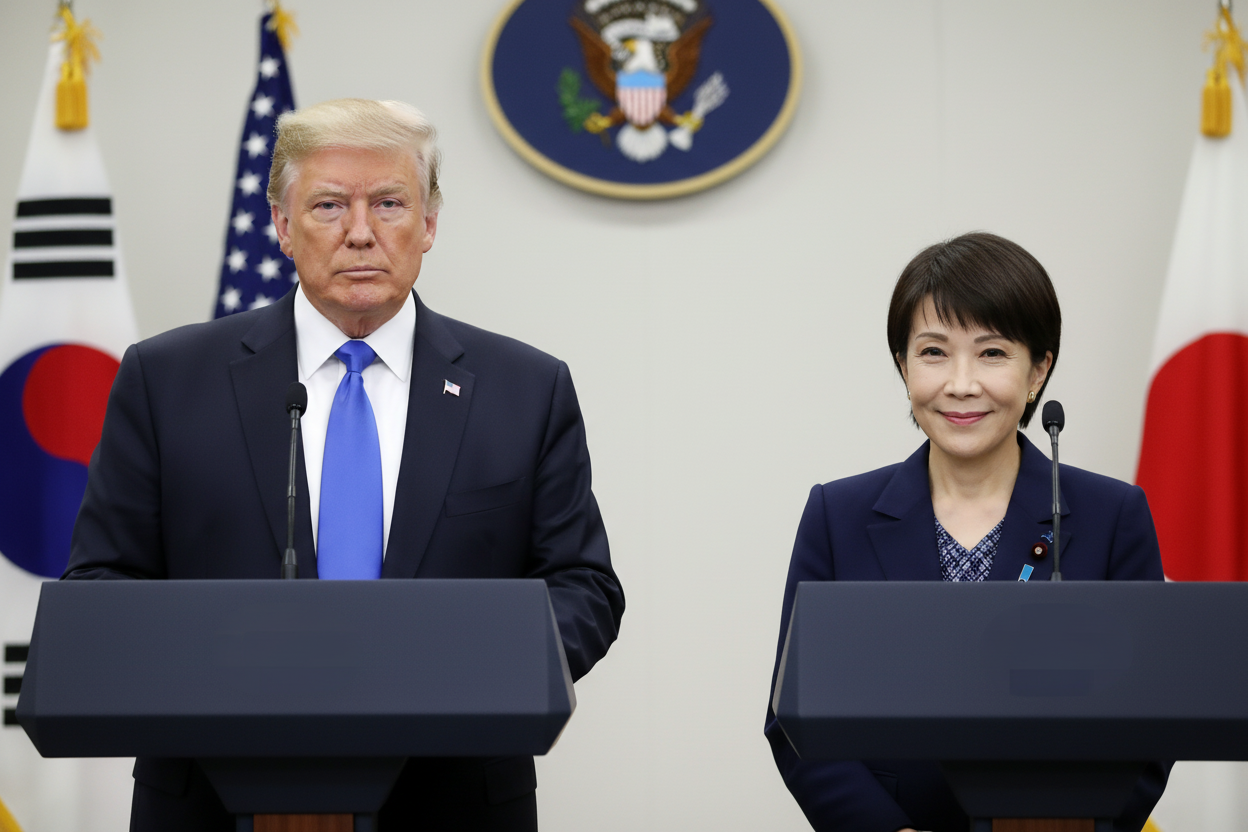Lee Jae-myung Meets Takaichi Amidst US Pressure, Calls Korea-Japan Deal 'Fair'

Trump Meets with Prime Minister Takaichi, Stresses US-Japan Trade Deal is 'Fair'
On October 28, 2025, U.S. President Donald Trump held his first summit with Japanese Prime Minister Sanae Takaichi at the State Guest House in Motoakasaka, Tokyo, to discuss ways to strengthen U.S.-Japan relations. This meeting, part of President Trump's Asian tour, took place ahead of his meeting with South Korean President Lee Jae-myung. During the summit, President Trump emphasized the importance of economic and security cooperation between the two countries, and described the US-Japan trade agreement signed this year as a 'very fair agreement' that benefits both nations. President Trump's remarks are expected to influence future US-Korea trade negotiations. The United States has consistently raised concerns about South Korea's trade surplus with the US, and it is believed that it will use the achievements gained through this US-Japan trade agreement to secure a favorable position in negotiations with South Korea. In particular, President Trump has emphasized an 'America First' policy that prioritizes US interests, so he is likely to maintain a hard-line stance in negotiations with South Korea.
US and Japan Agree to Strengthen Economic and Security Cooperation
President Trump and Prime Minister Takaichi agreed to further strengthen cooperation in the economic and security fields at this summit. In particular, the two leaders jointly signed implementation documents for customs negotiations to ensure the smooth implementation of the US-Japan trade agreement. This is seen as a demonstration of their commitment to developing a more stable trade relationship between the two countries. The two countries also signed the 'US-Japan Framework for Securing Key Minerals and Rare Earths for Mining and Refining' to strengthen cooperation for supply chain stabilization. This is interpreted as an effort to reduce dependence on China and strengthen economic security. Prime Minister Takaichi conveyed to President Trump Japan's plan to advance the timeline for increasing Japan's defense spending to 2% of GDP. This is interpreted as an expression of Japan's willingness to play a more active role as a US security ally. The United States has been demanding that Japan increase its share of defense spending, and Prime Minister Takaichi's announcement is seen as a measure to meet US demands. Through this summit, the US-Japan alliance has been further solidified, which is expected to have a significant impact on the security environment in Northeast Asia.
Agreement on Shipbuilding Cooperation and Establishment of Working Group
The United States and Japan signed a memorandum of understanding and agreed to form a working group at this summit to strengthen cooperation in the shipbuilding sector. This is interpreted as a strategic decision to respond to the recent growth of China's shipbuilding industry and strengthen the shipbuilding competitiveness of both countries. The United States and Japan have strengths in shipbuilding technology, and it is expected that this cooperation will further widen the technology gap with China. In addition, the two countries plan to strengthen cooperation in the development and construction of eco-friendly ships to lead the future shipbuilding market. This cooperation is expected to provide new growth engines for the shipbuilding industries of both countries. In particular, US shipbuilders are expected to improve productivity by utilizing advanced Japanese technology, and Japanese shipbuilders are expected to expand research and development investment based on the abundant capital of the United States. This US-Japan summit served as an opportunity to further elevate the relationship between the two countries, and achieved results in strengthening cooperation in various fields such as economy, security, and industry. President Trump's Asian tour is analyzed to be focused on reaffirming relations with US allies and strengthening pressure on China.
Future Prospects for US-Korea Relations
US President Donald Trump's visit to Japan and his summit with Japanese Prime Minister Sanae Takaichi provide important implications for future US-Korea relations. President Trump's emphasis on the US-Japan trade agreement as a 'fair agreement' suggests the possibility of demanding a similar level of concessions in trade negotiations with South Korea. The United States has consistently raised concerns about South Korea's trade surplus with the US, and it is expected that it will use the achievements gained through this US-Japan trade agreement to secure a favorable position in negotiations with South Korea. In particular, President Trump tends to emphasize the 'America First' policy and prioritize US interests, so he is likely to maintain a hard-line stance in negotiations with South Korea. Therefore, the South Korean government should develop a strategy to effectively respond to US pressure in future US-Korea trade negotiations. In addition, the United States is showing its intention to check China's influence in Northeast Asia by strengthening security cooperation with Japan. This US strategy also raises the need for strengthened security cooperation for South Korea, and South Korea should pursue a balanced diplomatic strategy that meets US demands while protecting its national interests.
